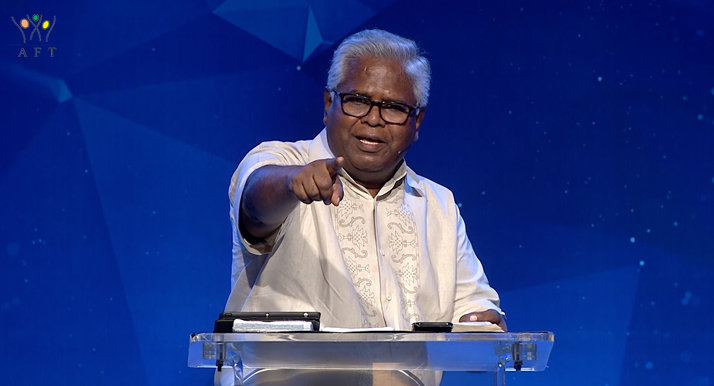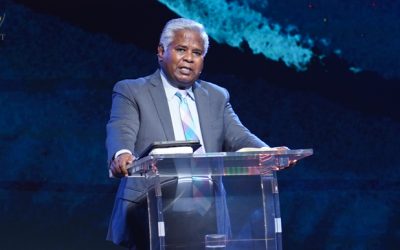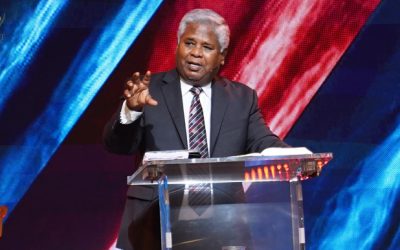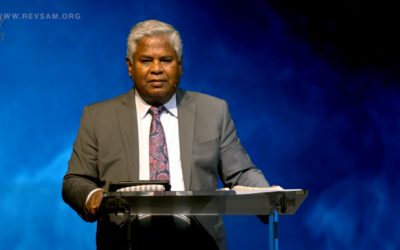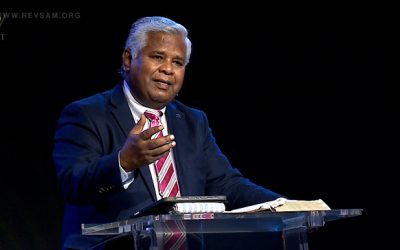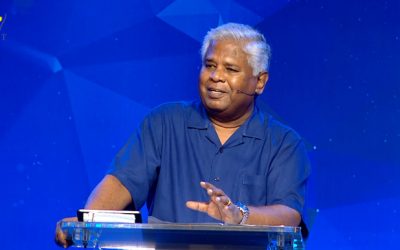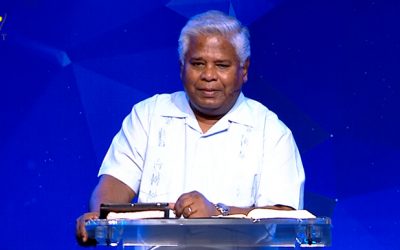
Abounding Grace (Vol 35) – The Gospel: A Message of Grace
Sunday English Service – 11 APR 21
Transcript
Let’s turn to the book of Galatians. Remember we were teaching a series on grace entitled it abounding grace, based on what Paul says in Romans chapter 5 and verse 20, where he says, “Where sin abounded, grace did much more abound.” What he means is when sin comes into a person’s life, it totally dominates and destroys and ruins everything, leaves it in shambles. But when grace of God, it comes into that person’s life at the time of salvation, it begins to work on that person. He needs to put together everything that has been destroyed, repair every damage, put together everything that is destroyed, make everything beautiful. Therefore, Paul says, “Where sin abounded, grace did much more abound.” Sin did a lot of damage, but grace is more than enough to make up for all that sin has done. When the grace of God comes into your life, really it restores you and brings beauty and brings all the goodness and benefits of God into your life in an amazing way. So that’s why we titled it abounding grace, it’s still abounds. Grace is abounding in our lives.
Now we talked about a lot of things and finally came to the book of Galatians. In Galatians, we have the best teaching on the gospel. And the gospel is basically the gospel of grace. In fact, there is a real tension going on there because there is so much confusion in the early church about what the true gospel is. Paul is actually talking there about how people have left the gospel that he had preached and gone into another kind of gospel. He says, “If anybody preaches any other gospel, other than what I’ve preached, let him be a curse.” He says. So people are twisting the gospel and people are having a lot of confusion about the gospel. And what is he referring to? Why is he talking like that? Because there are those that teach a works religion in the name of the gospel. It started doing that in the days of Paul. In the name of gospel, there’re preaching a works religion. What is a works religion? Work religion says that your salvation depends on your good works, is what you do that qualifies you before God. And that is a terribly wrong doctrine. Gospel is a message of grace. It is not about what you do. It is about what Jesus has done. That’s what makes Christianity so wonderful. It is not what you must do, it is what Jesus has done.
It is not even about what Jesus should do or what He will do. It is about what He has done. It is about what He has done and completed. It is never about what man should do. It is about what God has done. That’s why it’s good news or simply proclaiming not what you should do. Simply proclaiming what God has done. That is the essence of the gospel. But there were people that were going around teaching about what people should do, that they have left some things undone and they need to do that. And that is what will qualify them before God. Now, if you believe in a works religion, you’ll believe in that kind of a gospel, you’re doomed to fail in life. Why do I say that? Because when you believe that kind of a gospel, then you can never be sure about your standing with God. You can never be sure whether God really accepts you or not, because you are depending upon your works. And you’re never sure whether your works have been sufficiently good enough. It may be good enough today, what about tomorrow? It may not be good enough.
So every day you live in doubt, insecurity, it leads to condemnation, inferiority, and therefore you are never sure about whether God will bless you. You’re never sure whether your prayers will be heard. You are never sure whether God loves you and all these things become very great questions in your mind, there is never a certainty about these things. And therefore, you can never be happy and never be successful because you can never have the confidence that you are a child of God, that your sins are forgiven. That you have a standing with God that God loves you. That God is on your side, that God’s blessings belong to you. That kind of confidence is not there. And that confidence is not there, then you cannot succeed in life, then you cannot be happy in life. That’s the problem with that kind of a doctrine. And that kind of works religion is prevalent even today. People have always had struggle differentiating between the works religion and the grace gospel. Even our struggle even today.
When Paul was writing Galatians, he is writing because of this particular issue, because this is work religion, works religion that was spreading among the churches that he has established. And it is because the people have a tremendous misunderstanding about the gospel. And that was like 20 years nearly after the church was started. After 20 years, they still could not understand the gospel. They were struggling with it, even the apostles had to grapple with it, and had to reason and had to think much and think deeply in order to come to a conclusion about these things. So it is not an easy thing, it’s not like what you think. You just tell me, I will understand in five minutes, it’s not like that. These are things that Paul and others had to grapple with. I told you in my teaching on Tuesday nights on the apostle Paul, how the Paul, as soon as he met Jesus, he went to Arabia and spent some time there alone with God and he had to reconcile the old Testament with the truth he has now come across. He has met Jesus on the road to Damascus. Now his big question is this Jesus the Messiah?
If he is the Messiah, does the old Testament preaches suffering Messiah, because he has never seen it. He thought the Messiah should be reigning over everything. He’ll be the Supreme, lord of all, that He’ll be all victorious Prince. That’s the way he imagined the Messiah, his rabbis and his great teachers taught in that in those days, for many generations. So he never expected a suffering Messiah. Now he knows that Jesus was crucified on the cross and he has met the crucified Jesus, who’s now risen in person. He has seen Him. And that Jesus has spoken to him. He cannot deny that. Now he needs to go and see whether that Jesus is there. In the old Testament, he has mastered the old Testament. He was thorough with the law. He studied under the greatest teacher of his day, gone to the best school of his day and studied theology there. But he has never seen the suffering Messiah.
Now so he went to Arabia and he needed time and space. He needed time alone by himself to understand this, in order to reconcile these two things, Jesus Christ and the old Testament, and came back seeing Jesus in every page of the old Testament, there was a revelation. That’s why in Galatians chapter 1, when his apostleship is challenged, when people are questioning his authenticity and his authority saying that he’s not one of the original apostles like Peter and John and so on. He says, no, I have also seen Jesus, Jesus also appeared to me, plus I’m just like them because they received it from Jesus. They received their gospel straight from Jesus because they lived with Him and they were taught by Him. And he says, I also never got it from men. I was never taught it by man. It came to me as a revelation of Jesus Christ. He says. In chapter 1, verse 12.
So here is a man of revelation. He has given much thought to it. And the book of Galatians shows the depth of his thinking. He has gone deep into it, thought about it, grappled with this truth and has come to certain conclusions. He’s very sure about it. He is preaching it. And he’s very sure about it. Now he presents it in the form of two visits where he talks about in Galatians chapter 2. One is a visit by Paul to Jerusalem, along with Barnabas and a man named Titus, a Gentile, Greek Christian, who has never been circumcised, according to the Jewish custom. It brings them there to Jerusalem as a test case to see what they’ll do. He wants to test to see whether he has been preaching it right. Because he’s been preaching that we don’t need circumcision and all these ceremonial laws. So he wants to test his case. He wants to come to Jerusalem and see what the original apostles will do. Will they agree with them on this matter? So he brings him.
The second visit he talks about is the visit of Peter to Antioch, the city where he and Barnabas stayed for some time and ministered there in their church there, which was largely a Gentile Greek church. There was a lot of non-Jewish people in that church. And there are a lot of confusion happened when Peter came there because he was eating with the Gentiles okay but when some of the people, when the circumcision group that insisted on circumcision for even the Gentiles came, he wanted to please them. So he withdrew himself from the Gentiles and acted that way and Paul had to rebuke him in front of everyone else. So some conflict happened there. So he presents these two visits and in the form of these two visits, he gives this great, wonderful doctrinal teaching that explains the gospel. I love this passage chapter 2 is a very important passage. And that’s what we’re going to go into and deal with it for some time. This is too good. This is the shows the depth of Paul’s thinking, and then how profound he is in his thought and in his discovery of the truth concerning Christ and the gospel.
Let me read to you chapter 2 and verse 6, all the way to verse 14. But from those who seem to be something, whatever they were, it makes no difference to me. God shows personal favoritism to no man, for those who seem to be something added nothing to me. In other words, they added nothing to my gospel that I was preaching. They didn’t say your gospel is not sufficient enough. You need this and this, this and that to be added to it. They added nothing to me. In other words, they said, it’s okay, what you’re preaching is right. You don’t need to reduce anything. You don’t need to add anything. It’s right just the way it is. They agreed with me, he says. 7, but on the contrary, when they saw that the gospel for uncircumcised had been committed to me as the gospel for the circumcised was to Peter. For he who worked effectively in Peter for the apostleship to the circumcised also worked effectively in me, toward the Gentiles. And when James and Cephas and John who seemed to be pillars perceived the grace that had been given to me, they gave me and Barnabas the right hand of fellowship that we should go to the Gentiles and they to the circumcised. In other words, they heard them out. They heard the gospel that he preached. He verified with them to see if this was correct, wanted to check it out. And they agreed, this is perfectly fine.
They didn’t add anything to it. They didn’t find anything wrong with it. It was perfect, a 100% ripe. So they gave him the right hand of fellowship and told him to go to the Gentiles and continue his work. They desired only that we should remember the poor, the very thing, which I was also eager to do. Now, when Peter had come to Antioch, I withstood him to the face because he was to be blamed for before certain men came from James, he would eat with the Gentiles, but when they came, he withdrew and separated himself, fearing those who are with of the circumcision and the rest of the Jews also played the hypocrite with him so that even Barnabas was carried away with their hypocrisy. But when I saw that they were not straightforward about the truth of the gospel, I said to Peter, before them all, if you being a Jew live in the manner of Gentiles and not as the Jews, why do you compel Gentiles to live as the Jews. Now the second part of this passage deals with Peter’s visit to Antioch and we’ll come to it later on.
Let’s look at Paul’s visit to Jerusalem, along with Barnabas and Titus. What is happening is this. He brings Barnabas and Titus. As I said, a Greek Christian who has never been circumcised as a test case. And this is the very momentous occasion because if you think about it, Luke, the writer of the book of Acts was the companion of Paul. He writes the book of the gospel of Luke, as well as the book of Acts. He is a companion of Paul. So Luke and Acts, these two books are essentially a channel for Paul’s ministry and teaching, they say. In other words, what Luke is writing, you can take it as something that Paul would write because he’s getting all this stuff from Paul.
Similarly, a long tradition says that Mark was a companion of Peter. Mark wrote Mark’s gospel; he is a companion of Peter. Whatever he writes in the gospel of Mark came from what he learned from Peter and his preaching, all the parables and all the miracles that Jesus did that he refers to in Mark comes from Peter’s preaching that Marcus heard and he’s writing. So they say Mark represents Peter’s view of the gospel. Luke represents Paul’s view of the gospel. Now, if you take Peter, Paul and they go there, Paul goes there to meet Peter, James and John. So if you take Peter, James, John, and Paul who goes there, these four, you couldn’t get a better Supreme court panel of judges to decide on a doctrine any day. These are four great guys, between the four of them, it’s almost all the new Testament, except for the book of — the gospel of Matthew and the book of Hebrews, the author of the book of Hebrews, only the two are missing. Between the four of them, the entire new Testament was written by one of the four. So you have a great panel here. They’re going to come together. They’ve got to decide on something and what is decided comes as a result of their decision together. So this is a very momentous occasion because of the nature of this panel that is coming together.
Secondly, why did Paul go there? Think about that. He went there because of this group called the circumcision group in chapter 2 verse 12, he talks about those who were of the circumcision, a group of people in that church called the circumcision group. Now what this group of people taught and believed is something that you can read about in Acts chapter 15 verse 1 to 5 but we’re not going to read it. I’ll just mention it to you. What did they teach? What did they believe? Why are they called the circumcision group? This group said, yes, Paul is right, you should believe in Jesus Christ. Salvation comes through what Jesus has done on the cross of Calvary. You should believe in him, but it is necessary to add some things to it. Some things must be added to it. Like what? You not only have to believe in Jesus Christ, but you have to observe all the regulations that are called in the old Testament as ceremonial laws, regulations about eating, drinking, regulations about dressing, traveling, and all of those things. All given under the mosaic covenant as the ceremonial laws.
The laws can be divided into two kinds. One is the moral law, the moral laws, like the 10 commandments, thou shall not steal, thou shall not bear false witness, thou shall not murder, honor your father and mother. And everybody understands that that didn’t expire with the old Testament. How can you say that when the new Testament came, now you can murder, it’s all right, that commandment doesn’t apply? That will be foolish, isn’t it? Nobody will agree with that. In fact, in Romans and Ephesians and Colossians in every book that apostle Paul writes in the later section of the book, he simply takes the 10 commandments and gives an exposition like Jesus gives about it in the sermon on the Mount, the true exposition of what the 10 commandments means. So Paul never even ventured to touch the 10 commandments and say that this is not necessary, and nobody will do that because moral laws have always been there. It’s always right that man should not murder and man should not bear false witness, man should not commit adultery and man should not covet and so on. All those moral laws apply for all times because man has been given a moral nature and it comes with a package of that creation, moral laws, right?
But the ceremonial laws, the other kind of laws, laws can be divided into two kinds. One is moral law. The other is ceremonial laws. Ceremonial laws is about these things, what to eat, what to drink, how to dress, how to travel, how to wash your hand, this is even before Corona. These guys were into hand-washing. If you didn’t have — there was a procedure in hand-washing how you have to pour your water and how many times you’ve got to pour it and how you got to wash your hand and so on. And if you didn’t do it right, that was a big complaint. You remember Pharisees were complaining about how Jesus disciples were not doing it properly. These things were important to them. They were called clean laws. Ceremonial laws were called clean laws. Even how you dressed was very important. For example, even the fabric that you used in your dress was important. You cannot mix flax and wool. You cannot mix linen and wool. That is sin. You cannot mix flax and wool and go into the presence of God and worship God, you disqualify yourself by doing that. If you don’t wash yourself properly, you cannot go into the presence of God and worship God. You cannot eat certain kinds of foods. There’s a lot of food restrictions and all of these things were called ceremonial laws.
Now, these people also talk that you need to have circumcision done. Every male child has to be circumcised because since the time of Abraham, they were circumcised. They say under the law, it’s a must, you must be circumcised. Their point is this. Paul is preaching saying, this is not necessary. Circumcision is not necessarily because he’s preaching to a lot of Gentiles, non-Jews. They’re coming to believe in Christ. These people are saying, you need to circumcise them first, then baptize them and then join them in the church, and they need to observe all these ceremonial laws. They need to keep up with the washing and the clean laws and all that. Paul say, no, just leave that out. That’s not for now. He says. They’re saying, how can you say that’s not for now? It’s part of the Bible. It is not found in some rabbinical writings somewhere. We’re not coming from some other book, they’re coming from the Bible itself, the word of God. Those things are given to us by Moses. And it is found in Exodus, Leviticus, numbers and Deuteronomy. In the first five books of the Bible in the Torah, it is mentioned, how can you say that you have must observe one part of the Torah, which is the moral law and leave out the other part of the Torah, the ceremonial law. If you observe one, you have to observe the other. It is not right. A person who says that ceremonial laws should not be observed is not right. A person who thinks that this is not necessary now is not right. That is their contention. This is what brought about a problem.
And it got to such a place that Paul had to find an answer to it. In the church, there were two kinds of Jewish Christians in those days. You need to know this difference very thoroughly. That is one kind of Jews were those who practiced the ceremonial laws, but they didn’t think of it as the way of salvation. They thought of it as part of their culture. They have been raised eating a certain kind of food because the ceremonial laws demanded it. And that’s what they’ve been doing for generations from the time the guy who is born, he’s eating only certain kinds of food. He’s not touch certain meats. How do you expect him to all of sudden just because he’s Christian now be free to eat whatever meat is possible. He can eat whatever meat, but it’s not possible for him to just change just like that. So a lot of Jewish people that came to Christ remained in all practical matters of eating, drinking, clothing and all of that, basically Jews, because they have been following that and has become part of their culture. They followed it as a cultural thing, not as a requirement for salvation. They didn’t think of it as something that qualified them before God, they followed it because that’s what they’re used to. Just like you and I are used to some bar. What to do.
They didn’t give us a choice, eat some bar every day, morning, afternoon, night. So, you have to like some bar. Some culture is part, it’s a cultural thing just because I became a Christian, got named Samuel, I don’t eat bread and butter and jam. I still eat some bar. Culturally, that’s my food because that where I come from, that’s what I’ve been eating. So that is how they followed it. So they were Christians who came from Jewish background, followed those things, the ceremonial laws, as a matter of culture, not as a way of salvation, but there are other Jews in the same church that practice the ceremonial laws, not just as a matter of culture, they saw it as a way of salvation. They thought of it as a way of salvation. When they circumcised, they did it because they believed that without that you are not acceptable to God, you cannot come to God. That’s the way they thought about it.
Now, Paul was against that thinking, which said, this is the way of salvation. Paul was not against those people that were getting circumcised because that’s their habit. That’s their culture. That they were eating certain meats only because that their culture. He is not against it. He’s not preaching saying you must not circumcise, or you must eat certain meats that you have not been eating so far and so on. No, Paul was not teaching like that. Those who were following those practices as a matter of culture; Paul was fine with it. He was not preaching some kind of culture. He was not fine with this thing where they were going around, insisting Christians who came from Gentile background and requiring them to have themselves circumcised that, he did not allow and that he was against. And when Paul started preaching against that, that it’s not required, not necessary, these people, they really went through the roof. They really got lost their cool, they really became angry with Paul and there was a tremendous conflict.
Now, what is the purpose of the ceremony? The problem with those people that were practicing it in the wrong way, thinking of it as a way of salvation is that they did not understand the purpose of the ceremonial law. What is the purpose of the ceremonial law? I said, they call it clean laws. Why clean laws. I mean, hundreds of clean laws. I mean, you could never keep up with it. No matter how hard you try to keep up with these clean laws and wash your hands, do this and do that, and everything. If you follow to the detail, still you’ll be missing something. That is why when you went to worship God, anyhow, you needed a lamb and you needed to kill it and shed the blood and sprinkle that. And all of that is necessary still because you violated it somewhere because there are a thousand of these laws, you could never really fulfill all of them completely.
What is the problem with these people? They did not understand the purpose of the clean laws. What is the purpose of the clean laws? The purpose of the clean laws is to tell the Jewish people who were being prepared by God to receive Jesus as their Messiah in preparation in the old Testament days. God gave these clean laws because the clean laws meant that they were told every day they’re unclean. Every day they were told you’re unclean. If you touch a dead man, you’re unclean, you cannot come into worship. If you touch a Gentile, you’re unclean, you cannot come into worship. If you wore this kind of cloth, you’re unclean, you cannot come and worship. If you ate this meat, you’re unclean. You’re unclean. Every which way you turn, you’re unclean. All through the day, the clean laws, declared people as unclean, unclean, unclean, you’re not fit. Don’t come before God. You’re not qualified to come before God. Purposely God did that so that they will cry out to God and say, my God, if I’m unclean, if I cannot come and stand before my God, my creator, then how can I come before God? What will make me clean? Who can wash away my uncleanness and the ceremonial laws itself specifies what will wash away uncleanness, the blood of the lamb.
These were all symbolic teachings about Jesus and what he will do. It is simply saying you have sin. It is not what dirt you got in your hand. It is about a thing called a sin inside. And because of which you and I are unclean, everybody is unclean. And that only the blood of Jesus, what Jesus will do on the cross will set it right. That is the message. In order to tell that they were told every day are unclean. And they were told to practice the sacrifices and the sprinkling of the blood and all of those things, because they need to know that they’re unclean and there is solution for it. That is the blood of the lamb, but that Lamb’s blood is not willing to take them before God and qualify them before God, they’re washing your hands with some soap is not going to qualify them before God. Their sins have to be washed away the way God wants it washed away. This is the thing that teaching that was done. And when Jesus came, he was the fulfillment, the absolute perfect fulfillment of all of these ceremonial laws, everything that the ceremonial law demanded, every uncleanness of the ceremonial law, every uncleanness that the ceremonial law spoke about and every uncleanness that a ceremonial law represented were dealt with by the sacrifice of this one lamb of God, Jesus Christ on the cross of Calvary, perfect solution. He has come.
Now, Paul has no that light to of it. What he’s saying is, look, those things were given, the clean laws were given, so that you’ll realize that you’re unclean, and you’ll realize that there is a solution for it. That is why you’ve been practicing it in order to keep that before your eyes, that you are unclean, that there is a solution to become clean, but that was all symbolic teaching only. The actual fulfillment of that symbolic teaching has happened through Jesus Christ. And if I want a better example, I got to go back to my example that I’ve always used. When I think of a better example, I’ll tell you. But let me resort to the old example, I used to say. You go to Mount road, you’re on your way to Trichy. You want to go to Trichy on Mount road somewhere, it says Trichy, 320 kilometers. Now, what are you going to do? Park your car on the side and say, Trichy come on guys, we’re in Trichy, it says Trichy. This is Trichy. No. It says it’s pointing the direction of Trichy and saying, if you keep going this way for 320 more kilometers, you will now arrive in Trichy. When you arrive there, will tell you this is Trichy.
So the ceremonial laws were simply pointing to Christ, who is the solution for our sins problem. We’re all unworthy to come before God, Jesus Christ is the lamb of God, who washes our sins away and makes us clean. Makes us perfectly acceptable to God. If you keep following this one day the Messiah will come and He’ll die on the cross, He’ll shed his blood and when you see that, you will understand that the real solution has come. This is only shadows. When the real comes, you won’t need the shadows. Suppose I’m coming that way. And you see my shadow and you say, oh yeah, pastor Sam is coming there, because you saw my shadow. Now, after I come in, are you going to go after my shadow, looking for my shadow. No, after you see me in person, shadow becomes unimportant, not necessary anymore because now you have the real. Paul knows now after he has gone through the old Testament and he’s received the revelation of Jesus Christ, he has seen Jesus in every page of the old Testament. He sees Jesus as the fulfillment of all the ceremonial laws. And therefore, he says, I said to you, Jesus is the fulfillment of all the ceremonial laws, you don’t need to go back to the ceremonial laws. In fact, if you go back to the ceremonial laws and do all the washing and circumcision and all of that, you are dishonoring God, because the God who gave those things to point to this has sent this son and had Him die on the cross, He shed His blood and He gave His life there, and you are leaving that, and going back to this. What a way to dishonor God.
After God has done that much and brought to reality those things that were taught by the ceremonial laws. How can you go back to this and cling to this, useless to cling to it. In fact, by clinging to it, you are dishonoring God. The only way now you can observe the ceremonial law. All of the ceremonial law is to believe in Jesus as the solution for this uncleanness of your heart. And that only Jesus can bring you to God. Paul understood it perfectly. For Paul, this is a mighty revelation. He’s got depth. He has seen through it. When he was doing his PhD, they never taught him that. They never came to that point. They were still teaching, you’ve got to wash like this, and how many times you got to rub this way and that way. That’s the way they taught him. But now the revelation has come. He has understood what this is all about. This all is about Jesus Christ, and Jesus has come. If I go back to the ceremonial laws, that is the greatest dishonor to God, if I go back to the ceremonial law. I must go to Jesus.
It’s like you arrive in Trichy. You’ve got Trichy now, you don’t need the board now that’s say it’s pointing to Trichy. You’ve come to Trichy. You have arrived there. You are in Trichy. That is what Paul is saying, but those guys are not able to see it. They’re saying it’s in the Bible. How can you say what’s in the Bible? You should not follow. How can you say this is not necessary? We need circumcision? I can imagine Paul going back to Tarsus to his father’s house and telling them how he met Jesus, and this Jesus is the Messiah and all that. Now he’s the fulfillment of all that is in the old Testament. The old Testament is only a shadow. This is the reality, sharing his testimony, I’m sure his father looked at him and said my son Moses tells us to circumcise every child. How will God accept our child if we don’t circumcise? Child will die. We need to circumcise. Do you believe in Moses? Do you believe in the words yet? That’s the way they interpreted it. They couldn’t see the point about Jesus, but Paul could clearly see the point about Jesus. Therefore, he had no problem preaching to the Gentiles and inviting them to Christ and baptizing them and having them follow Jesus without burdening them with all the ceremonial laws of the Jewish faith.
He had no difficulty in understanding that and practicing that. He understood that ceremonial laws were never given to qualify us before God. This is what he’s been preaching. And he comes and tells the Jerusalem apostles and the Jerusalem apostles agreed with Paul on that. They gave him the right hand of fellowship, they said Paul real good, we like that revelation. What you’re saying is absolutely right. We see eye to eye on this matter. You’re right, go back, go to the Gentiles. Do your work. Nothing is wrong with the gospel that you’re preaching. Paul is so irritated by these fellows that are bothering him with the ceremonial laws. He calls them false brethen, Paul strongly believed. That’s why he would preach the gospel to the whole world. He strongly believed that you don’t have to embrace the Jewish culture in order to become a Christian. When you become a Christian, you don’t have to become culturally Jewish. You could be a Greek Christian. You can be a Roman Christian. You can be an Ethiopian Christian. Don’t have to become a Jewish Christian, whatever you are, you can remain. You don’t have to become a Jewish in order to become a Christian.
This difficulty arose only after the church started spreading among the Gentiles. The church started having a lot of Gentile converts. The first they started with the Jews, slowly gentle started coming in. When they got scattered from Jerusalem, they went to various towns and established churches. And you read in the 11th chapter of the book of Acts, that certain groups went in various places like Syria and so on and established churches among the Jews basically. And that was no difficulty. The Jews were Jews, but now they’ve received Jesus as Lord and savior. Like I said, they might’ve practiced the Jewish customs and so on. But as a cultural thing, not as a way of salvation. Now, they believe in Jesus as the way of salvation. But when they came to Antioch, the city of Antioch and established the church, they began to reach Greeks and Greeks became interested in Christ. And a lot of people came and accepted Christ as their savior and Lord, and they came and belonged to that church. Then only this problem started, what do we do with them? This group, the circumcision group saying, we must convert them to Jewish people first, then only you can make them Christians. This is the problem.
That is why — these people were in Tamil we used to have a saying [Foreign Language 00:39:46] Have you heard that? Some people are there. They have been in one culture. They have never been out of that culture. So they think with the one track mind, they cannot accept any other culture, any other thing, they think everybody is right only when they accepted their culture. You got to be eating some bar in order to be a human being. That kind of thinking, very narrow thinking. That’s why some exposure to other culture has some benefits, because otherwise you do not know sometimes whether or not you have really put your faith in Christ or whether you’re counting on your self-righteousness. You don’t know the difference between whether you really have faith in Christ or you’re counting on your self-righteousness. And believing that that’s the reason that God loves you. God loves you because you cut the hair to the correct length, specified by the mudras Christians. Because you wear your shirt exactly the same color as they have told you. And because you sing the songs the way they sing it, and you beat the drums only the way they beat it. Like this, never like this. Don’t go like that. That’s too much. That’s too much drums. That’s from the devil. That’s really from the devil, brother. They’re more familiar with hell than heaven. They’re sure that’s from the devil.
Why? Because it’s not like how they’re beating it. All that song must be from the hell. Have you ever been to hell and seen? Has hell ever composed songs, has hell ever come up with music. When the Protestant reformation come, when Martin Luther and them started writing songs and some of the greatest composers come from the Protestant reformation. It inspired a lot of songs and a lot of music and so on. All these gifts and abilities and talents come from God, but the very same Christians, even back in those days, if you played certain chords, they’ll throw you out of church. The chords which these guys play, every lane just about. It’s totally acceptable today, but back in those days, if you sounded those chords, that’s the chords from hell. You are going straight to hell. They’ll throw you out. They will excommunicate you from church. This is not allowed in church. That kind of thinking. When I was growing up, I grew up in a very strict atmosphere. I’ve told you when I first started shaving, I used to go to the barber shop and the guy used to put after shaver, after he shaved me and it used to feel like I’ve died and gone to heaven, it smelled so good and felt so good. And I just waited for the moment, but after you put the after shave you cannot come home, because in my home, they believe this is the world they’re coming into the house now.
So you get rid of the smell and then come home. Even powder was a sin. I’m not exaggerating even [Foreign Language 00:43:41] that is the girls having two, they have these two things hanging. I had sisters who never could do that. And if they’ll do it, they’ll go to the school and do it. But by the time they come back, they’ll make it one and come back. They’ll make sure they’ll have somebody do that into one and come back because you cannot come with two, so strict. And when I went to study abroad, they told me don’t become like those people. Those are all backslidden people. A lot of them are not right at all, going to hell only. So you study and come back just like we are, don’t change like them, they told. I wondered, why are they sending me there then? If those guys didn’t know anything. So I went there, landed up there and went to a Bible college and everybody looked like they’re straight from hell according to this definition. I had this one-track mind. I didn’t agree with these people here from the beginning, but I was afraid to challenge them because I didn’t have the authority, the biblical knowledge and all of that.
So I kept quiet most of the time, but I hated that kind of thing. So I kind of went along with them. I thought they were right only because I got to somehow change and accommodate myself into this thing, system. But when I went there, they were exactly the opposite of what these fellows said. They will disqualify every one of them, but I ended up going to a college like that. They said, makeup will land you right in hell, and everyone had makeup there, lipstick. Now God will remove your lips. You won’t have lips, if you put lipstick. That’s what I was told. But everybody had lipstick. Everybody had plenty of makeup. It looked like they went Saturday and spent the half a day in beauty shop to come to church on Sunday. Everybody was so well made up and their dresses were so beautiful and they dressed so well and so on. So I thought, my God, these people are gone case. No good. Are they going to go to heaven? That was my question. And then I see them prophesizing and worshiping the Lord, singing, their singing was so beautiful. Their [Inaudible 00:46:20] so many instruments, sang beautifully the entire student body was divided into four-part harmony.
Everybody’s sang and it sounded so good and so beautiful. I enjoyed it, started enjoying it. And I had to come to a conclusion whether they are right, whether these people are right. And I came to a conclusion, I came to the conclusion that our culture is one thing, and this culture is different. Here, this is the way they dress. Here, this is the way they are, a lot of cultural differences, a lot of cultural differences. And we couldn’t stand other cultures because we were grown up in one culture that we couldn’t stand to look at people from other culture. Very sad. So when I got exposed to this other culture, there’s people from all kinds of countries, they did their own thing. They dressed the way they wanted and they’re dressed like they dress up in their country, and so on. Then after a while, I got adjusted to that and my mind got adjusted to it. I had no problem with it. When I came back, everybody said, you have now changed. That’s the problem. You went there and you changed. You’re trying to change us. I was not trying to change anybody. This is the kind of problem that arose. This is very relevant for us also, even today lot of things which are simply cultural as are taught, like it’s in the Bible. It’s the way of salvation.
So wearing certain kinds of clothes, you cannot go to heaven. You wear makeup, you cannot go to heaven. You do this, this is sinful. If you do that, that is sinful. Every which way you turn, every time you turn anywhere, they said, this is not right, that is not right and so on. But God looks at us and gospel is the gospel of grace. We sing a song here, I love and I want to read that verse from which we sing, that we get that song in Isaiah chapter 61. We get it from Isaiah chapter 61. And Isaiah chapter 61 is where that passage comes, which is quoted by Jesus himself in the gospel of Luke gospel, according to Luke chapter 4. Remember in chapter 4, he goes into a synagogue in Nazareth and they hand him the scroll from the book of Isaiah and he opens and reads it. And from verse 18, we read, now reading from Isaiah 61. First, let me read this and then go and read Isaiah 61. Because in Luke 4:18, when he starts and reads, he stops right there in the middle. And I want to continue reading that in Isaiah 61. Look at what Jesus reads from Isaiah 61. The spirit of the Lord is upon me because he has anointed me to preach the gospel to the poor. He has sent me to heal the brokenhearted, to proclaim Liberty to the captives, and recovery of sight to the blind, to set at liberty those that are oppressed, to proclaim the acceptable year of the Lord.
What is the acceptable year of the Lord? He says, I’ve come to do these things, to do what? He has anointed me to preach the gospel to the poor, proclaim liberty to the captives, recovery of sight to the blind, set at liberty those who are oppressed. Why? Because it’s the acceptable year of the Lord. What is he talking about? Every 50th year for the Jews have been declared as the Jubilee year. Jubilee, it is declared as. What was Jubilee? Jubilee was a year when everyone was forgiven their debt. If you mortgage your house and you could not pay it back, you lost your house. The guy who gave you the money can take your house and enjoy it, not forever. He cannot simply take your house, he can take it and have it only for 50 years, he can use it or rent it and get income from it for 50 years, 50th year, he must return it to you, whether you paid it or not. So the lenders back then, when you went and borrowed in the Jewish nation, they calculated how many years are there for the next Jubilee. If there is 25 years, then they figured out how much will this house go for, for rent? How much can I get as income from this? Only that much within that amount, I can give this guy as loan.
So they don’t lose also. And this guy doesn’t lose this property also, even if he dies, his children will get the property back. 50th year is when all properties are returned, land or house is returned. And 50th year is when everybody goes free. In those days, if you don’t pay your loan back, you can be taken as a slave made to work as a slave. But on the 50th year, you go home, no matter how much you owed. On the 50th year, they have to release you. So just imagine that’s why it’s called Jubilee. It is a year of jubilation. There was such joy and singing and rejoicing in the nation in the 50th year. Jesus says that 50th year celebration that 50th year, Jubilee year speaks of what the Messiah will do, what Jesus has come to do. He says, now God has anointed me, anointed me for what? To preach the gospel to the poor, heal the brokenhearted, proclaim liberty to the captives, recovery of sight to the blind, liberty to those that are oppressed. These people have been oppressed by debtors and oppressed by been captives and didn’t have their liberty, their heart have been broken, crushed, because they’re lost their possessions. They’ve become poor. The gospel is coming to the poor. The people that lost everything.
And what is the gospel? It says, this is the acceptable year of the Lord. You can go home. Jesus is saying, the gospel is like that. Where Jesus, the Messiah comes in, he sets you free, sets you free from the debt that you owe to God because of your sin, sets you free from the mental oppression and the captivity to the devil and all of that, sets you free from the poverty that had bound you and all of that. The gospel is like that, is like the Jubilee year, whatever the Jubilee year has done, that is what the gospel is going to do. He says. So he reads up to there and then it says he closed the book and gave it back to the attendant and sat down. And the eyes of all those were in the synagogue were fixed on Him because, why is it fixed on Him? Because He is our Jubilee. He’s claiming whatever Jubilee year taught, that is fulfilled right in front of your eyes. He says. He began to say to them today, this scripture is fulfilled in your hearing. In other words, He is saying, you are looking at Jubilee. Jubilee is a person. It has arrived in the form of a person, Jesus Christ. He says.
Every eye was upon him. See the answer. I’m now going to go home now, am I going to be set free? My captivity is going to be over. My oppression is going to be over. Am I going to enter into my joy, my possession? Am I going to get back everything that I lost, is this my salvation, is he my salvation? They were looking at him. The things stops here. But if you read the original Isaiah 61, where he’s reading from, let me read from verse 61, see how it goes. The spirit of the Lord, God is upon me. This is what He’s reading there. Because the Lord has anointed me to preach the good tidings to the poor. He has sent me to heal the broken hearted, to proclaim liberty to the captives and opening of the prison to those who are bound to proclaim the acceptable year of the Lord and the day of vengeance of our God to comfort all who mourn.
And then he doesn’t stop there. He continues there. There it stops with the proclaiming of the acceptable year of the Lord. Here it continues and the day of vengeance of our God to comfort all who mourn, to console those who mourn in Zion, to give them beauty for ashes, the oil of joy for mourning, the garment of praise for the spirit of heaviness, that they may be called the trees of righteousness, the planting of the Lord, that he may be glorified. An amazing verse. They have a beautiful song that we sing. At the end, I want to sing that. He gave me beauty for ashes. I love that song. Comes right from this verse. So why has Jesus come? What is the gospel of grace? What does the gospel of grace say? The ceremonial law says you’re dirty, you’re unclean. Don’t come before God. You are not acceptable; this is no good. You got to clean yourself, clean your hands, clean your heart, clean this and clean that. That is the ceremonial law. They’re saying you’re not beautiful enough. You’re not good enough for God. You’re not acceptable enough before God. But the gospel of grace says that He gives you beauty for ashes. That’s the gospel.
The gospel says that Jesus Christ takes away your ashes and gives you beauty in the place of ashes. The sorrow of the heart is consoled, comfort all who mourn, console those who mourn in Zion, because the heart is not happy because there is condemnation. There is inferiority. There’s a sense of condemnation. There’s a sense of inferiority because there were living on works religion. They never qualify themselves before God. They’re always in doubt whether God accepts them or not. So they are never happy. There are morning in their heart. They’re never happy. They’re never satisfied. They don’t know that God loves them. So they’re afraid they don’t have any hope. And when Jesus comes, what he does, what does the gospel do? It comforts and consoles and gives them beauty for ashes. I love that. The oil of joy for mourning, because the heart is not happy. The face reflects that, something is wrong inside. Therefore, people’s face reflect that. They’re not fulfilled on the inside and you can see it in their face. It’s full of tension. There is a spirit of heaviness. They’re burdened by so many things, worried, burdened, going through pain. They have no hope. They’re afraid. There is no deliverance. And the gospel says what the gospel does is this, makes you beautiful. You preach the gospel like that. Everybody will come. It makes you beautiful.
The Bible describes us as the bride and Jesus as the bridegroom, right? Now, I conduct a lot of marriages here every year. Lots of marriages, normal times, just about every week we have marriage here. I have never seen yet one has not beautifully made up. They go spend about a couple of hours in the beauty place, beauty shop. Come here one hour late also sometimes because the bride is not made up yet. And when she comes, she’s absolutely stunning usually. And the guy that must play in, the bridegroom that’s standing here, he is about to fall off, struck by this beautiful woman that is coming, that he’s going to marry, so beautifully, they dressed her up. I mean, unimaginably well. All these experts work on her and get her like that.
And I tell you, if anybody can make you beautiful, Jesus can work on you and make you more beautiful than any beauty shop here. The beauty shops cost a lot of money and they will get their education everywhere, and they do such a good job nowadays. But Jesus is the best because he’s not fixing your beauty on the outside. He doesn’t start rubbing here, and putting this here, that here and adjusting this and that here and there. He starts from the inside. He starts by bringing constellation. He starts by bringing comfort. He starts by bringing peace. He starts by bringing joy. He starts working in the heart. He starts by giving hope. He starts by giving boldness and courage and confidence. He starts by telling you that you are loved. When you tell girls you are beautiful, the matter is over. You look at a girl and say, you’re so beautiful. Man, you can forget it. She’s going to lose herself, because the fact that she’s beautiful is very important to her. So when somebody compliments her like that, he really goes through the roof. Some of you looking at me, then how do you know? Well, it’s all the education reading and learning from books.
When a man says, you are beautiful to his bride, that is beautiful. She likes that. That makes her day. That makes her even more beautiful. That puts a new beauty on her. And I tell you the gospel of Jesus Christ, the gospel of grace tells you every second that you are most beautiful, because Jesus Christ has made you beautiful. That’s why when the gospel of grace is preached, people go through the roof. They want to shout and praise the Lord. They want to lift up their hands and rejoice in God. They want to celebrate this God, because He’s telling them every moment of every day, you are beautiful. He’s telling them every moment of the day, I love you. He says that is nothing more beautiful than you. That’s the gospel. What does the ceremonial laws say? It says, you don’t look right, you need a lot of work. Not only a lot of work, a lot of prayer, you need to be fixed this way, that way, this has to be changed, that has to be changed, your clothes have to be changed, your haircut has to be changed, this has to be changed. An endless adjusting on the outside. They are makeup artists. The preachers of the ceremonial law, the people that are preaching the works religion are makeup artists.
They are saying, we got touch up here, we got to touch up there, and when you go and get caught and a little bit of rain, all that is gone in a moment. It’s all patched up with all depends on what they do on the outside, but Jesus makes you beautiful on the inside so that no matter what happens on the outside, you are still beautiful. A storm can come and the wind can blow and your hair can blow every which way, still you are beautiful because it is about the beauty on the inside. It is about the comfort and the constellation and the joy and the hope and the faith and the courage and the confidence that exudes from inside. Amen? Have you got that? That’s the gospel of grace. Now I can understand why Paul was so angry and he called those brethren, false brethren. If anybody is preaching any of the gospel, other than what I preach, you are a cursed, he says. Because you are going around telling people that they’re ugly and they need fixing, and they need this, they need that. And I’ve just come through telling them that they are beautiful in Christ. I’ve just taught them that they look so good in Jesus Christ because Jesus Christ has made them beautiful. You are going and telling them, no.
All right, let me close with this. So for salvation, you don’t need this and that, it is Jesus plus nothing. That is what I preached, the last Sunday I preached. Jesus plus nothing was the title. Don’t add anything to Jesus. It is Jesus plus nothing. It is really true. It is Jesus plus nothing. You don’t need anything. Only one thing you need. And that is Jesus, to get saved, what do you need? You don’t need anything. Just need to put your faith in what Jesus has done, but do I have to do anything? No, you don’t have to do anything. He has done everything. So what do I do? Just trust in Him, trust in His goodness, trust in His grace, nothing that you do will save you. What He has done is enough to save you. You don’t need to add one more thing to it. Only Jesus. But after you get saved, you do a lot of things as a Christian. Is this the thing when you preach grace, a lot of people think, well, these people are not for works. They are preaching against good words. Who said? Ephesians chapter 2 verse 10 says that God has already before the foundation of the world has decided what good works you must do. And he has laid out the path very clearly, He has made out the map, the road in which you should travel to fulfill all those things that God has designed for your life to fulfill. And then only He came and saved you, recreated you in Christ Jesus. That’s the way Ephesians 2:10 is in the amplified version. Read it.
And Revelation chapter 14, verse 13 says that when you die, you don’t take anything with you, but you take your works with you. So to say that if we preach grace, that we do not emphasize works is wrong. We emphasize works, but not the kind of works that you’re talking about. You’re talking about works as a thing that qualifies you for salvation. We are talking about works that comes as a result of our salvation because we are like Jesus. We do His works, because we have his nature because we are born again. We do the works that He does. Let me just read a couple of verses and close. Matthew’s gospel chapter 25. Matthew’s gospel. No, Luke’s gospel chapter 6, Luke 6 verse 35 and 36. Look at the works that we do, all those that think that we don’t emphasize works. Look at the kind of works that we do. He says verse 35. Jesus says, but love your enemies, do good and lend hoping for nothing in return. And your reward will be great. And you will be sons of the most high for He is kind to the unthankful and evil. What is a Christian? He’s just like His Lord, just like His God, what is He like? He loves His enemies. He does good. He lends without hoping for anything in return. He’s kind to the unthankful and He’s kind even to the evil, therefore be merciful.
Next verse, just as your father also is merciful. In other words, He says, “You are a child of God. Therefore you also be merciful.” Be kind, be merciful. Matthew’s gospel chapter 25. Jesus says in the last day, one of the ways that God will know whether or not you’ve really put your faith in Him is that you will have cared for the poor. He says I was hungry and you fed me, and I was thirsty, you gave me the drink, and I was in prison, you came and saw me. That particular passage. He is talking about how He’s going to identify those that belong to him. Those that belong to him will be of this type. That they deal with the list of all the people and minister to them. They have the nature of God. And that shows that they belong to God. They’re not doing that to qualify before God, they are not helping the poor in order to really get enough credits to take them before God and claim their heaven, saying I got enough credit, give me heaven. No, that is what we think is wrong. They’re doing it because they have the nature of God, they’re the children of God, and that is what they’ll do. A Christian is one who enjoys lifting the poor from their plight.
In Matthew’s gospel. John, the Baptist in chapter 11, John, the Baptist is in prison and hears about Jesus works, mighty works that He’s doing. And he wants to know whether He’s the one, the Messiah to come, or they should wait for another. So he sends his men to inquire with Jesus and they come and ask, are you the one or should we wait for another? And Jesus says to those people that came to ask from Him in Matthew’s gospel chapter 11, in the first few verses Jesus answered and said to them, go and tell John the things that you hear and see, the blind see, the lame walk, the lepers are cleansed and the deaf hear, the dead are raised up and the poor have the gospel preached to them. Just go tell John I’m preaching the gospel to the poor. The poor is going to be uplifted. I’m delivering people, healing people, helping the poor. That means He’s the one. That’s what He is saying. So let me say to you, after we get saved, we do a lot of things. For salvation we do only one thing. To receive salvation, we do only one thing. What is that one thing? This last verse. Romans chapter 6 and verse 4, Romans chapter 4 and verse 5. Romans chapter 4 verse 5. It’s says, but to him who does not work. In other words, he says, you want to get saved stop trying to prove that you are so righteous. You are so good. That you have so much credit on your side. That you’ve done so much good. Stop that. Stop your work, he says.
To him who does not work, but believes on Him who justifies the ungodly. Believe in the God who takes a sinner and just justifies him and treats them as if he has never sinned, his faith is accounted for righteousness. A lot of people, they have a wrong foundation. Their foundation is their righteousness. That you be good, God will be good to you. That you be good, then God will accept you. That your goodness counts for something, that your goodness qualifies you before God, that’s their foundation. That foundation has to be broken up. Those people have to see that their righteousness could not save them. It is only Christ’s righteousness that is freely bestowed upon us. That is our salvation. That’s the gospel of grace. It is not about how good I am. It’s not about what I do. It is about how good He is and what He has done for me in and through Jesus Christ. Shall we all stand together. Let’s lift up our hands and give thanks to God.
How Grace Changes Us? (Part 12): Fruit of the Spirit
How Grace Changes Us? (Part...
How Grace Changes Us? (Part 11): Endurance
How Grace Changes Us? (Part...
How Grace Changes Us? (Part 10): Truth
How Grace Changes Us? (Part...
How Grace Changes Us? (Part 9): Pride
How Grace Changes Us? (Part...
How Grace Changes Us? (Part 7): Peace
How Grace Changes Us? (Part...
How Grace Changes Us? (Part 6): Kindness
How Grace Changes Us? (Part...
How Grace Changes Us? (Part 5): Forgiveness
Abounding Grace (Vol.48) -...
How Grace Changes Us? (Part-4)
Abounding Grace (Vol. 47) -...
How Grace Changes Us? (Part-3)
Abounding Grace (Vol. 46) -...
How Grace Changes Us? (Part-2)
Abounding Grace (Vol. 45) -...


